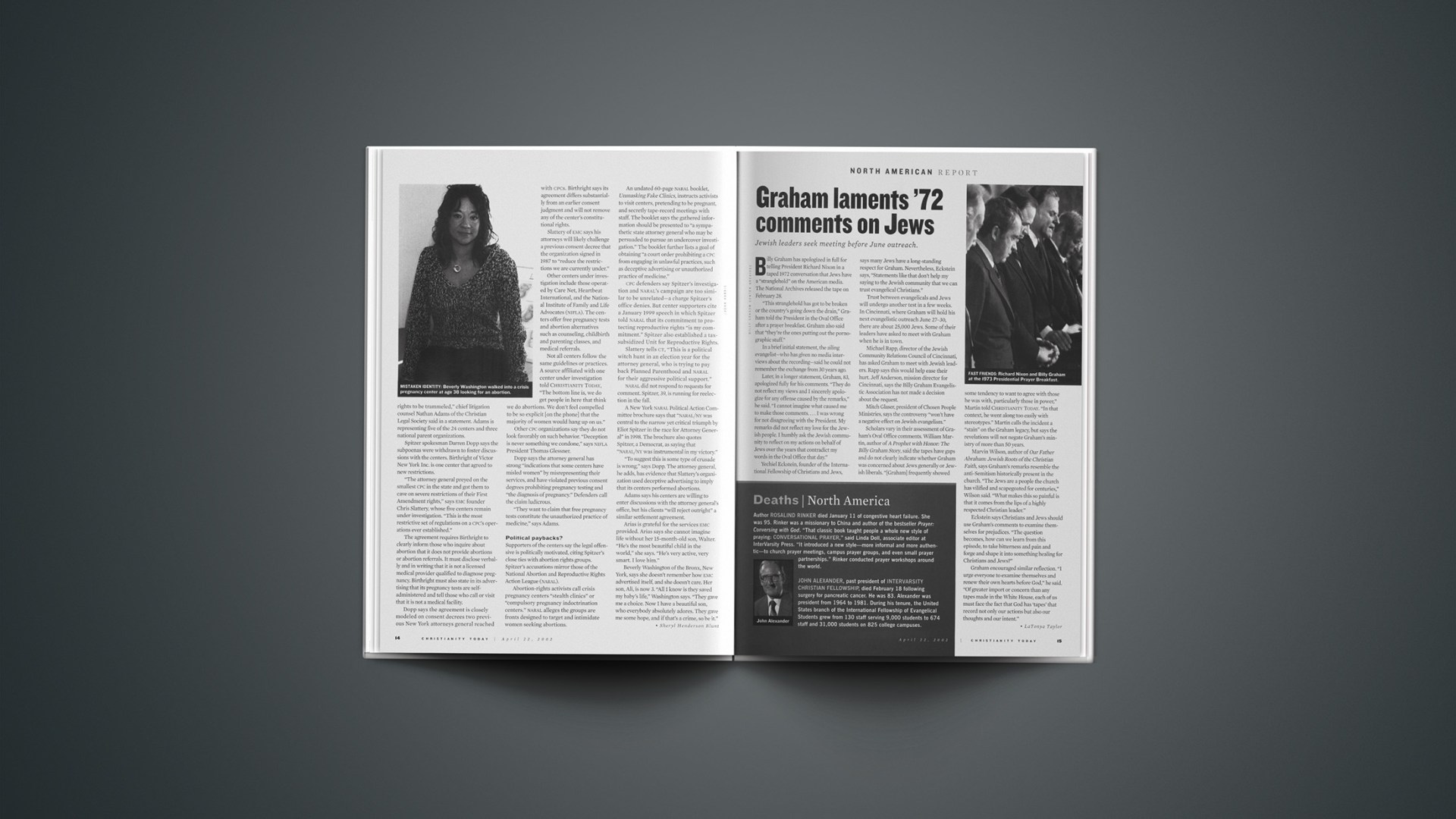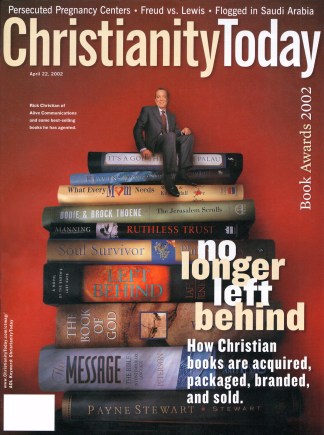Billy Graham has apologized in full for telling President Richard Nixon in a taped 1972 conversation that Jews have a “stranglehold” on the American media. The National Archives released the tape on February 28.
“This stranglehold has got to be broken or the country’s going down the drain,” Graham told the President in the Oval Office after a prayer breakfast. Graham also said that “they’re the ones putting out the pornographic stuff.”
In a brief initial statement, the ailing evangelist—who has given no media interviews about the recording—said he could not remember the exchange from 30 years ago.
Later, in a longer statement, Graham, 83, apologized fully for his comments. “They do not reflect my views and I sincerely apologize for any offense caused by the remarks,” he said. “I cannot imagine what caused me to make those comments . …I was wrong for not disagreeing with the President. My remarks did not reflect my love for the Jewish people. I humbly ask the Jewish community to reflect on my actions on behalf of Jews over the years that contradict my words in the Oval Office that day.”
Yechiel Eckstein, founder of the International Fellowship of Christians and Jews, says many Jews have a long-standing respect for Graham. Nevertheless, Eckstein says, “Statements like that don’t help my saying to the Jewish community that we can trust evangelical Christians.”
Trust between evangelicals and Jews will undergo another test in a few weeks. In Cincinnati, where Graham will hold his next evangelistic outreach June 27-30, there are about 25,000 Jews. Some of their leaders have asked to meet with Graham when he is in town.
Michael Rapp, director of the Jewish Community Relations Council of Cincinnati, has asked Graham to meet with Jewish leaders. Rapp says this would help ease their hurt. Jeff Anderson, mission director for Cincinnati, says the Billy Graham Evangelistic Association has not made a decision about the request.
Mitch Glaser, president of Chosen People Ministries, says the controversy “won’t have a negative effect on Jewish evangelism.”
Scholars vary in their assessment of Graham’s Oval Office comments. William Martin, author of A Prophet with Honor: The Billy Graham Story, said the tapes have gaps and do not clearly indicate whether Graham was concerned about Jews generally or Jewish liberals. “[Graham] frequently showed some tendency to want to agree with those he was with, particularly those in power,” Martin told Christianity Today. “In that context, he went along too easily with stereotypes.” Martin calls the incident a “stain” on the Graham legacy, but says the revelations will not negate Graham’s ministry of more than 50 years.
Marvin Wilson, author of Our Father Abraham: Jewish Roots of the Christian Faith, says Graham’s remarks resemble the anti-Semitism historically present in the church. “The Jews are a people the church has vilified and scapegoated for centuries,” Wilson said. “What makes this so painful is that it comes from the lips of a highly respected Christian leader.”
Eckstein says Christians and Jews should use Graham’s comments to examine themselves for prejudices. “The question becomes, how can we learn from this episode, to take bitterness and pain and forge and shape it into something healing for Christians and Jews?”
Graham encouraged similar reflection. “I urge everyone to examine themselves and renew their own hearts before God,” he said. “Of greater import or concern than any tapes made in the White House, each of us must face the fact that God has ‘tapes’ that record not only our actions but also our thoughts and our intent.”
Copyright © 2002 Christianity Today. Click for reprint information.
Related Elsewhere
Also appearing on our site today:
Nixon’s GhostThe late President’s tapes brought more pain—and a genuine act of repentance.
Beliefnet.com has the audio clips from the 1972 tapes, a timeline of Graham’s relationship with Jews, an interview with Cal Thomas, and articles written by Richard Land and Graham biographer William Martin.
The official BillyGraham.org site has Graham’s statement on “Intolerance and Prejudice Following Release of Nixon White House Tapes.”
In a 2000 profile for Christianity Today sister publication Christian History, William Martin said Billy Graham as an evangelist has preached to millions and as an evangelical has put a movement on the map. Martin’s A Prophet with Honor: The Billy Graham Story is available at Christianbook.com.
Previous Christianity Today coverage of the 1972 comments controversy includes:
Weblog: Was Billy Graham an Anti-Semite? The Commentaries ContinueBilly Graham’s 1972 Oval Office comments about Jews have continued to draw reaction from newspapers and magazines. (March 11, 2002)
Weblog: Graham Was Seduced By Power, Say PunditsGraham’s Jewish comments: the commentaries are in. (March 6, 2002)
CT Classic: On Befriending PresidentsBilly Graham’s relationship with Richard Nixon was already a controversy in 1972. (March 4, 2002)
Weblog: Graham Says 1972 Oval Office Comments ‘Do Not Reflect my Views, and I Sincerely Apologize’“Although I have no memory of the occasion, I deeply regret comments I apparently made.” (March 4, 2002)
Weblog: Nixon Still Haunts Billy GrahamEvangelist’s 1972 comments with president called anti-Semitic. Plus many more stories from around the world. (March 1, 2002)
Christianity Today coverage of Billy Graham’s relationship with the Jewish faith includes:
Graham Feted By American Jewish CommitteeIn 1977, Graham walked a fine line between in his work ‘to proclaim the Gospel to Jew and Gentile.’ (Nov. 18, 1977)
Billy Graham: ‘I have never felt called to single out the Jews’The evangelist discusses targeted evangelism in one of his most quoted statements. (March 16, 1973)










